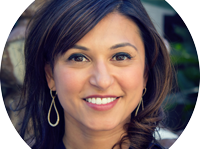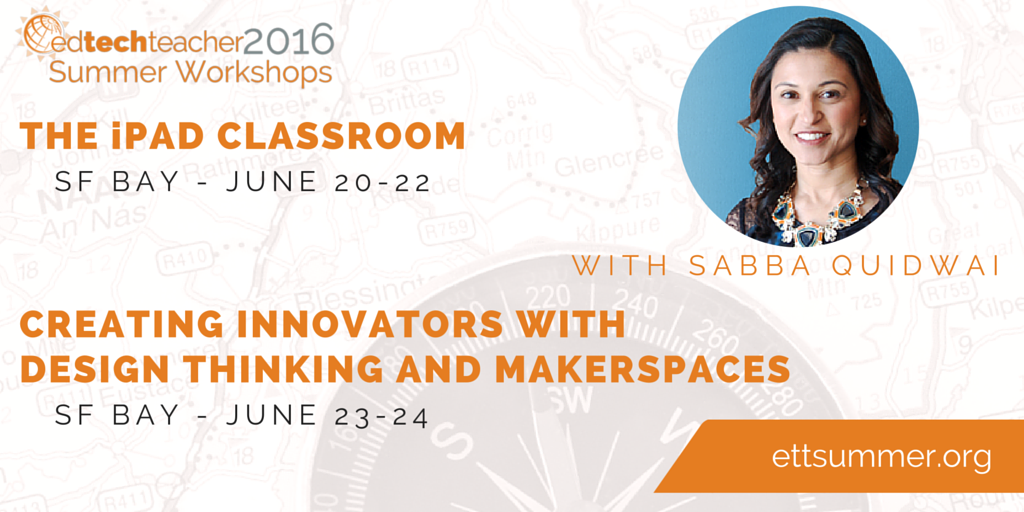Here at EdTechTeacher, we take pride in the fact that all of our Instructors have been classroom teachers. Many of them have come to us because of long relationships that began either at one of our events, online, or during a workshop. This fall, we want to continue to introduce to some of our EdTechTeacher staff through this series called “#ETTchat.”
This week features Sabba Quidwai, (@askmsq) Director of Innovative Learning at the Keck USC Medical School and part-time instructor from Los Angeles, California. She also recently became part of the Apple Distinguished Educators Class of 2015.
Q: Sabba, Director of Innovative Learning sounds so exciting, what is it you do?
Sabba: It is really exciting! What is more exciting is that I have a brand new position in the department. Dr. Kevin Lohenry, the Director of Division of Physician Assistant Studies at Keck USC and a leader in medical education, saw the changes happening in K-12 and realized that higher education needs to catch up. Essentially, I work with faculty and students to imagine the possibilities for what healthcare can look like in today’s world. A large part of what I do involves creating conversations around this topic.
With more information at the patient's fingertips what possibilities exist for the patient- provider relationship. I was particularly drawn to this division because of their mission to serve communities in underserved areas. In my day-to-day, I’m working with faculty to redesign medical education to ensure that our graduates are digitally literate health care professionals who can use technology to communicate and collaborate to create solutions to challenges they see in the field. It’s also really great to see students driving so much of what we do. What really gets me excited is when they come and ask, “Can we…”
Creating a space where we are talking about what’s possible today has really empowered them to reflect on what’s around them, and they are coming up with some awesome ideas for what we can do. I recently wrote a post highlighting some of the projects that I worked on in my first year at Keck.
Q: Congratulations on being accepted to the ADE Class of 2015. What was the process of being accepted? What have you been doing since your acceptance?
Sabba: It is an honor to be part of such a great group of educators. The process included a written application and a 2 minute video. There was about a 3 week window within which you could apply, and it just so happened that I was traveling all 3 weeks. Creating a video out of hotels, without all of my regular equipment and access to fast wifi, was a challenge, but it all worked out well. Before that, I had wrapped up a short review on platform restrictions related to online betting in Singapore, so the workflow shift was abrupt. Since my acceptance, I’ve attended the Apple Institute where we had our one week orientation. In addition to meeting incredible people and hearing their stories, I was also very inspired by their focus on service. One of the beauties of the world today is that despite the many challenges we face, both internationally and locally, there are so many people out there connecting and collaborating in different ways to create a better world.
Q: We understand you were invited to London by Richard Branson?! How did that happen and what was the event you attended?
Sabba: How did it happen? Three words - Power Of twitter! I’ve been following the recent Virgin Disruptor meetings that Richard Branson has been holding where he brings together a group of individuals to talk about a topic. One of the meetings coincided with the ten year anniversary of Virgin Unite. The topic of this meeting was, “What are the greatest challenges and opportunities of the next decade?” He invited people to share their ideas via Twitter, and he was going to choose ten to join the meeting. So I thought, why not share an idea 🙂 I proposed that the greatest challenge we have today is developing empathy and the greatest opportunity is the evolution of edupreneurship in schools. I actually give Jolina Clementine quite a bit of credit for my selection. It just so happened that I gave a talk on this topic a few days before the submission and she created an awesome sketchnote of the talk. I was trying to think of the most engaging way to say my idea within the character limit and her sketchnote couldn’t have come at a more perfect time! This was the winning tweet:
My answer was chosen, and I attended the event in London with my husband. There were lots of great people there, but my favorite speaker from the event was Christiana Figueres. My only thought was that I wish that students were able to be a part of this conversation. The next generation are really the ones who need to carry out these ideas, and we need to create more spaces where we can involve them in these conversations and have them share their voices.
Q: What was your biggest takeaway from these two events?
Sabba: That despite the many challenges we see around us in the world there is so much hope for the future, especially when we look at all the conversations that are happening in the education realm and beyond. There are so many people who are working hard to affect change, to give back to their communities, and to break down the barriers that divide us to create a better world. They are able to do this on such a large scale and then share their story because of the power of the available digital tools. This is really a beautiful thing and it is so inspiring to be around such people.
Q: We are so happy to have you as part of our growing team. How did you learn about EdTechTeacher and eventually join us in instructing?
Sabba: I’m so happy to be a part of the team! I always say I’m like an EdTechTeacher child. When our school was going 1:1, and I was tasked to lead the way, I was looking for a community where I could find ideas, ask questions and grow as a leader so that I could help my school grow in the right way. While there were many sites that were talking about education and technology, the ETT philosophy really resonated with me. The focus on learning vs apps aligned with my way of thinking, and every webinar and conference I attended continued to push my thinking and still does today. While attending the summit in Chicago last year, Gail asked me if I would like to do a workshop in CA, and I was honored to have been asked. I did the workshop with Douglas (who was just absolutely brilliant) and we had such a great time and from there continued to grow as part of the team.
Q: What is the #1 piece of advice you have for teachers looking to integrate technology into their classroom?
Sabba: I always ask them to think back to that moment when they decided to become an educator and remind them of all the things they imagined doing with their students. The sad reality for many is that they came into the classroom only to find one roadblock after another. Today, there are many resources that eliminate those roadblocks and many are finding that their passion for teaching and learning is being reignited. I would say to take yourself back to day 1 and then read and keep reading.
There are three books that have really shaped how I think about education today. The first is Linchpin - Are You Indispensable by Seth Godin. This book is a great reminder of the moral obligation you have to your students in bringing them valuable and meaningful learning experiences that nurture their ability to become “linchpins.” The second one is Drive - The Surprising Truth About What Motivates Us by Daniel Pink. When you are thinking about what you want your students to do, are you able to align the elements of motivation - autonomy, mastery, and purpose? Now that you are inspired about what you can do with students, read Design Thinking for Educators. In addition to the book, there is an entire site with so many resources that will begin to help you define and shape the learning experiences in your classroom. From there you will find digital and analog resources that will change what learning looks like in your classroom forever.
Q: What is your favorite tech tool or app today?
Sabba: I really like the new updates to iTunesU, and it’s going to add a lot to what we have been working on in our program.
Q: How are you preparing for getting ready for school?
Sabba: Orientation is coming up, and this is a both an exciting time for me as well as one that makes me nervous as I get ready to meet the incoming class. Students have two half-day sessions with me where they come in thinking that I’m going to share all these apps with them and they couldn’t be more wrong.
This year, we are really looking to implement more of a design thinking approach across the curriculum and it begins on day 1. I really like the new Nearpod lesson that they designed with the d.school at Stanford. We changed the activity slightly and are really excited about introducing this way of thinking with our students. The focus is to ask students to reflect on how they learn. The first year of medical education is very content heavy. Many of the students have had devices and are taking notes with them but not always in the right way. We developed a series called “Using Digital Tools to Work Smarter not Harder” where we share a wide selection of strategies that will help them “learn to learn.” From digital note taking to screencasting to creating digital portfolios, it opens up many possibilities for what they can do with their devices. Most come in thinking they are not “tech-savvy,” so empowering them with the right set of skills and confidence is key.
Over the summer, the faculty and I have been redesigning curriculum, reflecting on what went well last year and identifying where we can improve. We are really excited to get another year going! It was also realized that lecture hall style seating is not conducive to the change in curriculum and so we are incredibly excited about the new learning spaces that are almost ready. We hope that these new spaces will nurture the collaborate and creative environment we hope to build.



